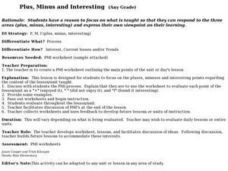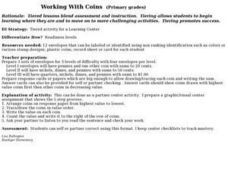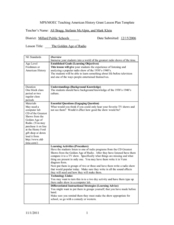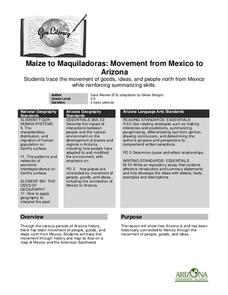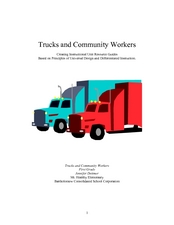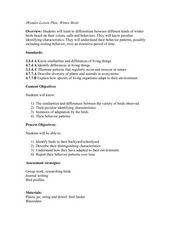Curated OER
Plus, Minus and Interesting
Students identify the main ideas or topics of a lesson or unit using the plus, minus and interesting graphic organizer. For this main idea or topic lesson, students examine the use of the PMI graphic organizer. They describe the item...
Curated OER
Working With Coins
Students arrange coins based on their value. For this coins lesson, students trace and record the value of each coin. Students count up to find the total value of all the coins.
Curated OER
Mathematicians Research Projects
Young scholars research a famous mathematician and create a presentation of their research. In this famous mathematician research lesson, students decide on a famous mathematician that they would like to learn more about. They conduct...
Curated OER
Civil War
Students explore the Civil War. In this U.S. Civil War U.S. history lesson, students participate in a cubing activity in which a variety of Civil War projects are described on a paper cube. Students roll the cube to determine...
Curated OER
Multicultural Holidays
Young scholars create a cube exploring different holiday traditions. For this multicultural appreciation lesson, students research Christian, Jewish, Muslim and Kwanzaa holiday traditions. This lesson encourages the use of an individual...
Curated OER
Wars and Conflicts
Students explore the concepts of war and conflict. In this research skills lesson, students use Internet and print sources to research the causes, effects, main events, and significant figures of selected wars.
Curated OER
Immigration in Nebraska
Students will examine data and research the historical backgrounds of various ethnic immigrants. In this Immigration lesson, students will examine the impact of immigration on the state of Nebraska. Students will research a facet of...
Curated OER
The Golden Age of Radio
Eleventh graders analyze popular radio shows of the 1930’s-1940’s. In this American History lesson, 11th graders examine life before television and one of the ways people entertained themselves....
Curated OER
Could the Civil War Been Avoided Through Compromise?
High schoolers determine whether the American Civil War could have been avoided. In this Civil War instructional activity, students examine primary and secondary sources to prepare to participate in a classroom debate that requires them...
Curated OER
Lyndon B. Johnson's Presidency
Students interpret historical evidence presented in primary and secondary resources. In this presidential history lesson, students research the accomplishments of Lyndon B. Johnson. Students create wanted...
Curated OER
Voices or the Holocaust
Eighth graders determine how victims of the Holocaust fared. In this World War II lesson, 8th graders collaborate to research Holocaust deportation, ghettos, resistance, hiding, escape, and survival. Students discuss their findings...
Curated OER
Dialogue Tags/ Synonyms for Said
Sixth graders analyze dialogue tags. In this synonyms lesson students work in groups analyzing a personal narrative. They enter the words onto a classroom chart as well as their notes or journal. The students replace tags with more...
Curated OER
Signing a Poem
Students interpret poetry though movement. In this poetry lesson students take a poem they've previously read and discussed in class and work in pairs to develop gestures for each line.
Curated OER
Tooling Around Arizona: Reading Arizona Maps
Students research Arizona maps. In this map lesson, students discuss map titles, scales, directions, elevation, and symbols. The class will examine topography, landforms, and rivers found on an Arizona map.
Curated OER
Maize to Maquiladoras: Movement from Mexico to Arizona
Students label maps of Arizona and Mexico of the products that moved from one place to another. In this Arizona and Mexico lesson plan, students also summarize the effects of the movement on life in Arizona.
Curated OER
Trucks and Community Workers
First graders identify community helpers and their roles. In this transportation lesson plan, 1st graders complete a series of lessons integrating technology and literacy. Students decode sounds of short u, c/s/ and g/j/ words and...
Curated OER
iWonder Lesson Plan: Winter Birds
Young scholars report on the colors, calls, behaviors, and physical characteristics of different winter birds. In this winter birds lesson plan, students also make a bird feeder.
Curated OER
Who's Sharing Our Stories on "The Hill"?
Students explore parliamentary structure. They study the roles & responsibility of key players or representatives. This lesson presents a wide variety of rich activities students can engage in to further their understanding of...
Curated OER
Beetle Wheels
Second graders link the development of skip-counting patterns to bars on a relationship graph. They also plot our skip-counting patterns on a hundred's board, counting by 2's and also by 4's.
Curated OER
Exploring the Personal Narrative
Students define the characteristics of a personal narrative, explain the difference between a 'memoir' and an 'autobiography', and create a reading journal in which they will log their reading activities. In this personal narrative...
Curated OER
Scavenger Hunt
Second graders participate in a Scavenger Hunt to find out how long 1 cm is. They then find 10 objects that estimate to be 1 cm in length and record their findings on the table provided and check their estimates using a ruler.
Curated OER
Biographical Research Paper
Students choose a subject for a biographical research paper. They use books, the Internet, encyclopedias and articles to gather information on a determined subject then follow a rubric to write a research paper.
Curated OER
Now One Foot, Now the Other
Second graders, working as a whole class, with partners or small groups, use various Web sites to investigate the relationship between generations.
Curated OER
Wappo Indians of Napa County
Third graders describe the American Indian nation in their local region long ago and in the recent past in terms of national identities, religious beliefs, customs, and various folklore traditions. They synthesize their findings into a...


